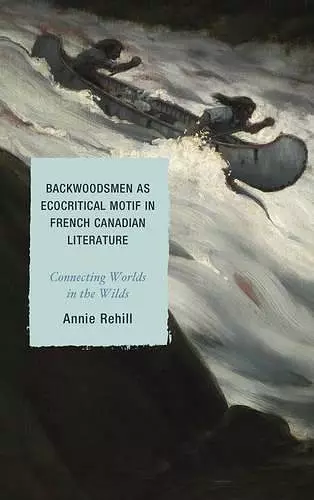Backwoodsmen as Ecocritical Motif in French Canadian Literature
Connecting Worlds in the Wilds
Format:Hardback
Publisher:Bloomsbury Publishing PLC
Published:30th Aug '16
Currently unavailable, and unfortunately no date known when it will be back

In New France and early Canada, young men who ventured into the forest to hunt and trade with Amerindians (coureurs de bois, “runners of the woods”), later traveling in big teams of canoes (voyageurs), were known for their independence. Often described as half-wild themselves, they linked the European and Indian societies, eventually helping to form a new culture with elements of both. From an ecocritical perspective they represent both negative and positive aspects of the human historical trajectory because, in addition to participating in the environmentally abusive fur trade, they also symbolize the way forward through intercultural connections and business relationships. The four novels analyzed here—Joseph-Charles Taché’s Forestiers et voyageurs: Moeurs et légendes canadiennes (1863); Louis Hémon’s Maria Chapdelaine (1916); Léo-Paul Desrosiers’ Les Engagés du Grand Portage (1938); and Antonine Maillet’s Pélagie-la-Charrette (1979)—portray the backwoodsmen operating in a collaborative mode within the realistic context of the need to make money. They entered folklore through the 19th century literary efforts of Taché and others to construct a distinct French Canadian national identity, then in an unstable and continually disrupted process of formation. Their entry into literature necessarily brought their Amerindian business and personal partners, thus making intercultural connections a foundation of the national identity that Taché and others strove to construct and also mirror. As figures in literature, they embody changing ideas of the self and of the cultures and ethnicities that they connect, both physically and in an abstract sense. Because constructions of self-identity result in behavior, studying this dynamic contributes to ecocritical efforts to better understand human behavior toward both ourselves and our environment. The woodsmen and their Amerindian partners occupy the intriguing position of contributing to both damage and greater acceptance of the cultural Other, the latter of which holds the promise of collaboration and joint searches for sustainable solutions. Thus coureurs de bois and voyageurs, far from perfect models, can continue to serve as guides today.
Any good book should raise more questions in the reader’s mind than it can hope to answer. Rehill’s selection of texts, her historical and literary analyses and her thinking with and against current ecocritical work raise important questions about the value and the viability of ‘cross-cultural reflection and collaboration’ (p. 185). * Bulletin of Francophone Postcolonial Studies *
This argument serves as an important illustration of the contribution that the study of literatures in languages other than English can bring to ecocriticism as a whole. Scholars of French-Canadian literature will no doubt appreciate this study for the historical and literary background of the coureur de bois, and the focus on the links between wilderness and human establishments should be of interest to ecocritical scholars of all stripes. * The French Review *
Annie Rehill’s analysis of literary portrayals of coureurs de bois and voyageurs offers an environmentally motivated view that is complicated and deepened by a historical foundation? that increases awareness of the complexities involved in the human journey on Earth. It will be of interest to scholars and students in Québec studies, Francophone studies, and ecocriticism, as well as to general readers concerned with the environment. The book could be useful in Québec literature and Francophone cultural studies at both the graduate and undergraduate levels, and it could be used for courses in literary criticism and environmental studies. -- Denis M. Provencher, University of Arizona
Backwoodsmen as Ecocritical Motif in French Canadian Literature focuses on one
?established figure? to offer an innovative perspective ?informed by ecocritical and postcolonial theories. Inspired by? intercultural intersections and environmental concerns, the study reinvigorates approaches such as those of Said, Serres, and Glissant, ?to reach pragmatic conclusions that ?will provid?e fertile material for discussion and debate? in courses centered on issues of relevance to both the Francophone world and the planet as a whole.
ISBN: 9781498531108
Dimensions: 237mm x 160mm x 22mm
Weight: 513g
228 pages